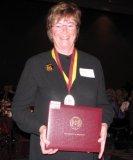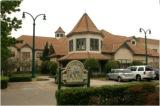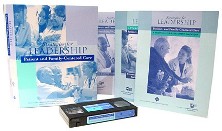| Patient and Family Engagement: Institute Partners on AHRQ Grant |
Improving the quality and safety of health care in the United States is one of the most significant challenges facing the American health care system today. A critical step on the path towards safer, higher quality care is encouraging and facilitating patient and family engagement to improve health care experiences, care delivery, and outcomes.
The Agency for Healthcare Research and Quality awarded a multi-year grant to a team of organizations led by the American Institutes for Research to develop, evaluate, and implement a Guide to Patient and Family Engagement to improve quality and patient safety in hospitals. The Institute for Family-Centered Care is proud to be one of the partners on this team. Other organizations include Consumers Advancing Patient Safety, the Joint Commission, the Health Research and Education Trust, Carilion Health Clinic, Planetree, Maryland Patient Safety Center, and Aurora Health Care.
The guide will consist of tools, materials, and training for patients, families, hospital clinicians, staff, and administrators and leaders in adult hospital medicine and surgical units. The guide will:
- support the involvement of patients and family members in their care;
- encourage the involvement of patients and family members in improving quality and safety;
- facilitate partnerships among patients, family members, and health care professionals to plan and implement meaningful change, and;
- outline steps for successful implementation.
Patient and family advisors serving adult medicine and surgical inpatient units will participate in the development of the guide and materials. READ MORE
|
| Articles of Interest |
There is an increasing body of evidence that the experience of care is important, that it matters how health care practitioners communicate with patients and families, and that the active participation of patients and family members in clinical care and in policy and program development will enhance outcomes. Here are three articles that may be of particular interest: Leape, L., Berwick, D., Clancy, C., Conway, J. Gluck, P., Guest, J., et al. (2009). Transforming healthcare: A safety imperative. Quality and Safety in Healthcare, 18(6), 424-428.
Frustrated by the slow pace of progress in patient safety in the decade since the publication of the Institute of Medicine’s report, To Err is Human, members of the Lucian Leape Institute at the National Patient Safety Foundation authored this article. They present five key concepts and practical strategies for transformation—transparency, integrated care platform, patient and family engagement, joy and meaning in work, and medical education reform. To achieve meaningful and sustainable change they “envisage patients as essential and respected partners in their own care and in the design and execution of all aspects of healthcare.” This is a must-read article for all those interested in organizational change, patient safety, and patient- and family-centered care.
Grumbach, K. (2009). Redesign of the healthcare delivery system: A Bauhaus 'form follows function’ approach. JAMA, 302(21), 2363-2364.
What can we learn about redesigning health care systems from the Bauhaus school of arts and crafts? Quite a lot, according to Kevin Grumbach, Chair of UCSF Department of Family and Community Medicine and Chief of Family and Community Medicine at San Francisco General Hospital. Instead of continuing to repair a system that is designed from a clinician-centered perspective, Grumbach asks what if we applied the “form follows function” dictum of the Bauhaus movement? Grumbach proposes that we design our health care systems around a more practical function – “the patients’ need for convenient, timely, reliable, and culturally appropriate access…” He also calls for patients to be actively involved as essential members of teams working on health care redesign.
Weingart, S. N., Simchowitz, B., Eng, T. K., Morway, L., Spencer, J., Zhu, J., et al. (2009). The You CAN campaign: Teamwork training for patients and families in ambulatory oncology. Joint Commission Journal of Quality and Patient Safety, 35(2), 63-71.
Dana-Farber Cancer Institute (DFCI) in Boston, MA—long term proponent of partnering with patients and families to improve the quality and safety of health care—sought to develop, implement, and evaluate a high-performance teamwork training program for ambulatory patients and their families at their comprehensive cancer center.
DFCI created the You CAN teamwork training campaign with feedback from multiple stakeholders, including the DFCI pediatric and adult patient and family advisory councils, administrative leaders and clinical staff, health educators, and communications specialists. CAN is an acronym for “Check. Ask. Notify.” The program and its slogan were intended to encourage—but not obligate—patients to use teamwork techniques to partner more effectively with their health care providers.
The authors conclude that exploring the opportunities and limitations of patient engagement in ensuring safe care is an important emerging area of research and practice.
From time to time, Pinwheel Pages will highlight articles about patient- and family-centered care from the Institute's on-line bibliographies. We welcome any suggestions for additions to our bibliographies.
|
| Institute Faculty Members Receive Awards |
 Patricia Sodomka, FACHE, Senior Vice President of Patient- and Family-Centered Care for MCGHealth and Director of the Center for Patient- and Family-Centered Care of the Medical College of Georgia, was named one of the Georgia Hospital Association's (GHA) 2009 Hospital Heroes. GHA's Hospital Hero Award is given to 11 exceptional individuals whose leadership and dedication have significantly enhanced patient care, their organization, and their community. Patricia Sodomka, FACHE, Senior Vice President of Patient- and Family-Centered Care for MCGHealth and Director of the Center for Patient- and Family-Centered Care of the Medical College of Georgia, was named one of the Georgia Hospital Association's (GHA) 2009 Hospital Heroes. GHA's Hospital Hero Award is given to 11 exceptional individuals whose leadership and dedication have significantly enhanced patient care, their organization, and their community.
Pat—one of the pioneers and leading proponents of patient- and family-centered care (PFCC)—along with other leaders, created MCGHealth’s Center for Patient- and Family-Centered Care. The Center conducts and supports research that broadens opportunities to build patient-provider partnerships, strengthen health care quality, and increase students’ knowledge and practice of PFCC. In 2009, Pat accepted, on behalf of MCGHealth, the Socius Award from the National Patient Safety Foundation.
Pat frequently participates in national and international conferences, and MCGHealth learning labs to teach others how to implement PFCC in their health care settings. Pat is the founding Chair of the Georgia Hospital Association Partnership for Health and Accountability, a statewide coalition focused on improving quality and patient safety in Georgia’s hospitals. In addition, she has authored or co-authored nearly 20 articles on PFCC in publications such as the Georgia Academy Journal and the Joint Commission Journal on Quality Improvement.
“What Pat Sodomka has done to strengthen the relationships between patients, families, and health care providers is truly remarkable,” said Joseph Parker, president of GHA. “Her revolutionary approach to patient care has changed it for the better and will have a positive impact for future generations of hospital patients. She is a deserving recipient of this award.”
 In celebration of the University of Minnesota School of Nursing Centennial, the Nursing Alumni Society honored 100 Distinguished Nursing Alumni and Distinguished Faculty Alumni, culled from over 8500 living alumni. Marlene Fondrick was among those honored on November 5, 2009 for their profound impact on families, communities, the school, or the nursing profession. Marlene was recognized for her work advancing the practice of patient- and family-centered care in hospitals and other health care organizations throughout the country and in military treatment facilities around the world. In celebration of the University of Minnesota School of Nursing Centennial, the Nursing Alumni Society honored 100 Distinguished Nursing Alumni and Distinguished Faculty Alumni, culled from over 8500 living alumni. Marlene Fondrick was among those honored on November 5, 2009 for their profound impact on families, communities, the school, or the nursing profession. Marlene was recognized for her work advancing the practice of patient- and family-centered care in hospitals and other health care organizations throughout the country and in military treatment facilities around the world.
Marlene has experience working as a clinician and an administrator in both maternity care and pediatrics, and served as the director of a perinatal center. She is the former Vice President for Patient Care Services at Children’s Hospital in St. Paul, Minnesota, and also served as a Vice President for the two merged Children’s Hospitals in the Twin Cities. Marlene served as a facilitator for NACHRI’s Focus Groups for newborn intensive care, working with neonatologists and nursing leaders on quality improvement projects.
In addition to serving as faculty for Institute seminars and training activities, Marlene co-teaches two Institute webinars on creating and sustaining patient and family advisory councils.
|
|
 |
| Dallas Seminar Participants ~ Sign Up For Hospital Tours! |
Participants in the April 2010 Hospitals and Communities Moving Forward with Patient- and Family-Centered Care training seminar will have the opportunity to tour the sponsoring hospitals while in Dallas.
 On Sunday, April 18th, come tour Our Children’s House at Baylor (OCH)—a unique pediatric specialty hospital whose multi-disciplinary team works in collaboration with families to provide care for children who have had life-changing experiences, helping to ensure a successful transition from hospital to home care. Although OCH is not big, the warm Victorian exterior, bright interior colors—even a nurses’ station whimsically modeled after a boat sailing the seas—create a warm, safe environment for children, with restful spaces they and their families can enjoy, including a chapel, family room, prayer garden and courtyard area. On Sunday, April 18th, come tour Our Children’s House at Baylor (OCH)—a unique pediatric specialty hospital whose multi-disciplinary team works in collaboration with families to provide care for children who have had life-changing experiences, helping to ensure a successful transition from hospital to home care. Although OCH is not big, the warm Victorian exterior, bright interior colors—even a nurses’ station whimsically modeled after a boat sailing the seas—create a warm, safe environment for children, with restful spaces they and their families can enjoy, including a chapel, family room, prayer garden and courtyard area.
On Tuesday, April 20th, choose either a tour of Baylor University Medical Center at Dallas, Baylor Health Care System’s 1,000-bed flagship hospital or a tour of the Children’s Medical Center Dallas.
 The Baylor tour includes the Cvetko Center, an education and support center for cancer patients and families by patients and families; a visit with Caring Hearts patients and families who partner with those undergoing a similar cardiovascular experience; and the opportunity to learn about the new Pastoral Care initiative that provides local and system resources for spiritual healing and care. The tour ends with a visit to Baylor’s 2003 centennial exhibit—a permanent collection of Baylor’s milestones—and a visit with leaders and patient advisors from its nationally ranked rehabilitation hospital. The Baylor tour includes the Cvetko Center, an education and support center for cancer patients and families by patients and families; a visit with Caring Hearts patients and families who partner with those undergoing a similar cardiovascular experience; and the opportunity to learn about the new Pastoral Care initiative that provides local and system resources for spiritual healing and care. The tour ends with a visit to Baylor’s 2003 centennial exhibit—a permanent collection of Baylor’s milestones—and a visit with leaders and patient advisors from its nationally ranked rehabilitation hospital.
Participants who tour the Children's Medical Center will learn about Children's patient- and family-centered programs and will tour a number of areas that have embraced the philosophy and implementation of patient- and family-centered care, including the Emergency Department, the Center for Cancer and Blood Disorders, and the Krissi Holman Family Resource Center.
 All three tours start at 2:00 PM. Registration required....space is limited. All three tours start at 2:00 PM. Registration required....space is limited. |
| Leapfrog Top Hospital Survey List Includes Pinwheel Sponsors |
The Leapfrog Hospital Survey is a highly respected survey that compares hospitals’ performance on the national standards of safety, quality, and efficiency that are relevant to consumers and purchasers of care. Hospitals that participate in The Leapfrog Hospital Survey achieve hospital-wide improvements that translate into millions of lives and dollars saved. In 2009, 1206 hospitals across the country completed The Leapfrog Hospital Survey.
Congratulations to the following Pinwheel Sponsors named among the 45 Leapfrog Top Hospitals for 2009:
- Brigham and Women's Hospital;
- Children's Hospital Boston;
- Children’s Hospital of Pittsburgh of UPMC;
- Children's Hospitals and Clinics of Minnesota;
- Cincinnati Children's Hospital Medical Center; and
- Vanderbilt University Hospital and The Monroe Carell Jr. Children's Hospital at Vanderbilt.
The survey is a national, public comparison of hospitals on key issues including mortality rates for certain common procedures, infection rates, safety practices, and measures of efficiency. Qualifying criteria for Leapfrog’s Top Hospital Award list remain virtually the same as 2008, with one added dimension: once hospitals demonstrate top quality, they must also rise to the top of the list on efficiency.
“This year’s class of top hospitals not only hits the mark in areas such as medication error prevention and preventing ICU deaths, but they also use their resources wisely, providing excellent and efficient outcomes for patients,” said Leah Binder, CEO, The Leapfrog Group. “Regardless of what happens to health care reform, these hospitals are the future.”
Congratulations to all those who made the list, with special kudos to our Pinwheel Sponsors! |
|


 On Sunday, April 18th, come tour
On Sunday, April 18th, come tour  The Baylor tour includes the Cvetko Center, an education and support center for cancer patients and families by patients and families; a visit with Caring Hearts patients and families who partner with those undergoing a similar cardiovascular experience; and the opportunity to learn about the new Pastoral Care initiative that provides local and system resources for spiritual healing and care. The tour ends with a visit to Baylor’s 2003 centennial exhibit—a permanent collection of Baylor’s milestones—and a visit with leaders and patient advisors from its nationally ranked rehabilitation hospital.
The Baylor tour includes the Cvetko Center, an education and support center for cancer patients and families by patients and families; a visit with Caring Hearts patients and families who partner with those undergoing a similar cardiovascular experience; and the opportunity to learn about the new Pastoral Care initiative that provides local and system resources for spiritual healing and care. The tour ends with a visit to Baylor’s 2003 centennial exhibit—a permanent collection of Baylor’s milestones—and a visit with leaders and patient advisors from its nationally ranked rehabilitation hospital.  All three tours start at 2:00 PM.
All three tours start at 2:00 PM. 
